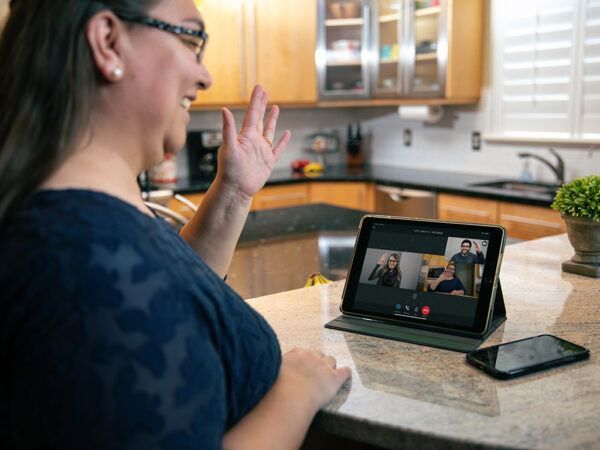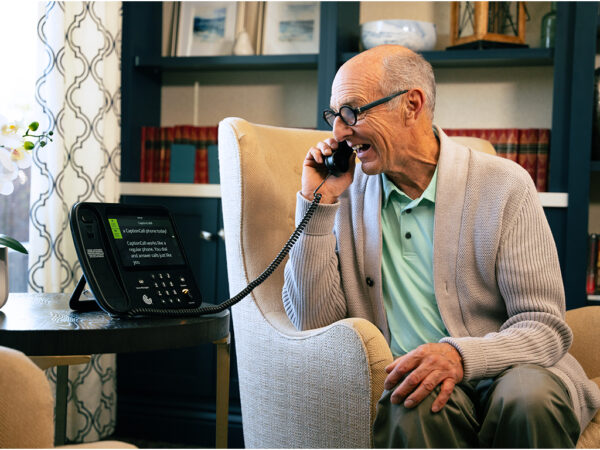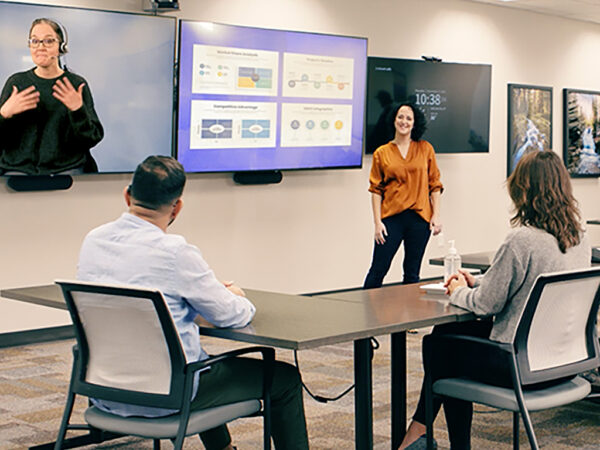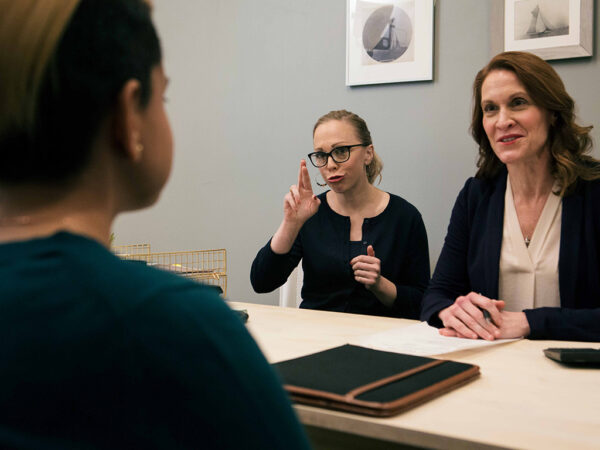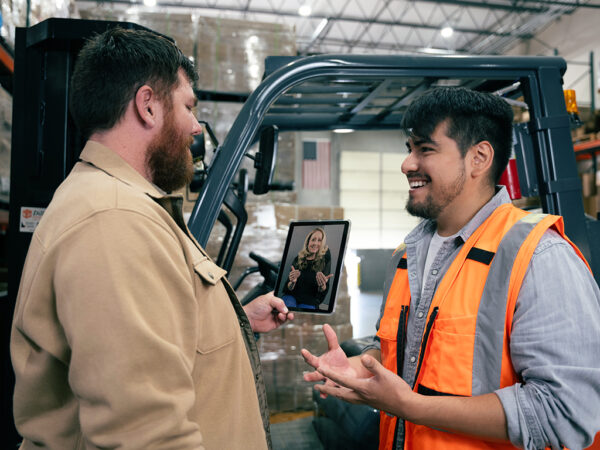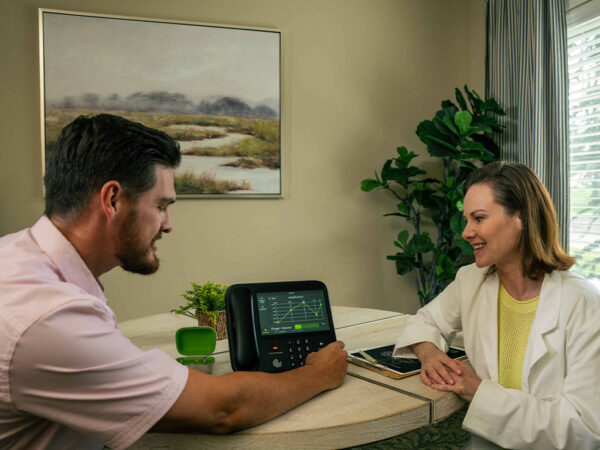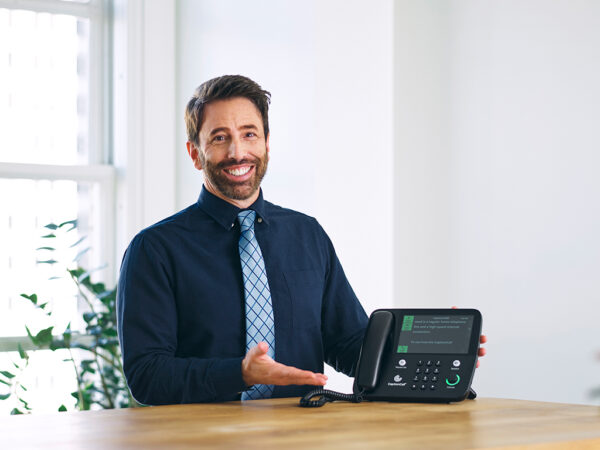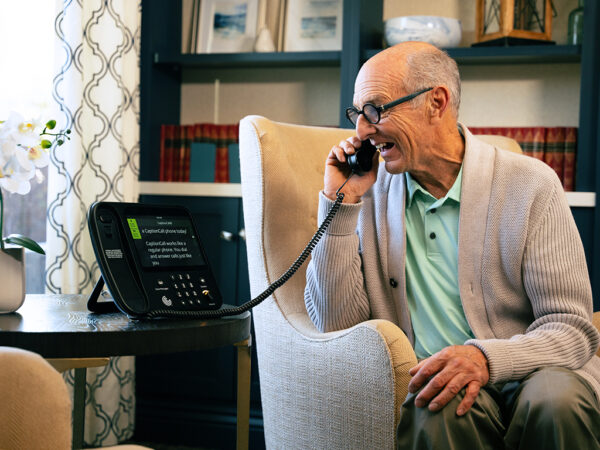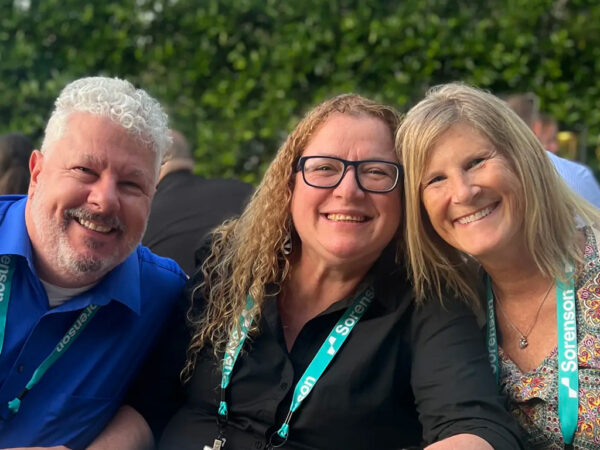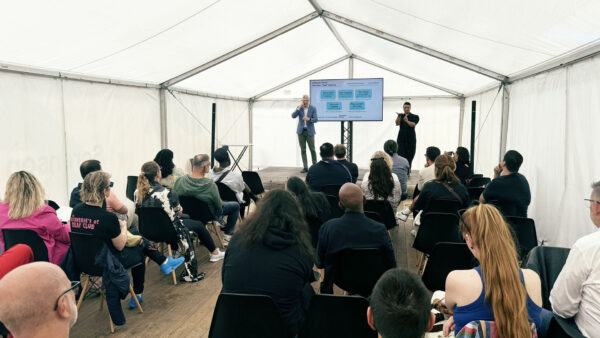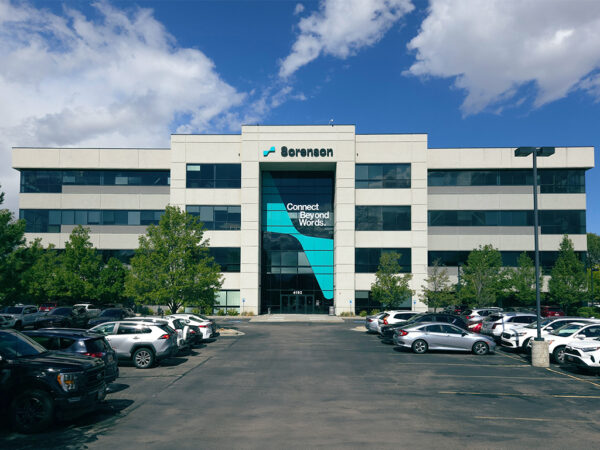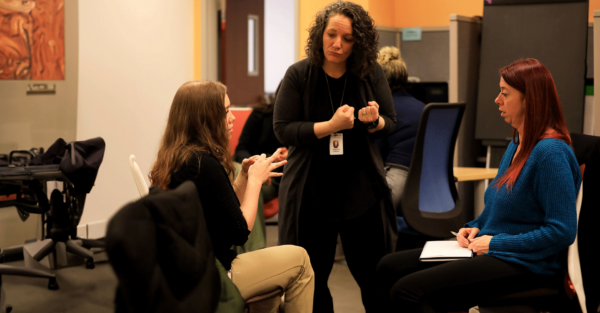Accessibility research
Something that is likely important to you is to see how accessible a company is. Career centers, especially those at Deaf-centric universities like Gallaudet and RIT/NTID, and your network are excellent ways for you to find companies who are open to hiring Deaf employees.
One other thing that is very helpful these days is now you can find out how a potential employer addresses accessibility. There are various third-party organizations that survey companies and their employees to see how they are doing with accessibility and then share those results with the public.
For example, Disability:IN is a nonprofit organization that measures a company’s Disability Equality Index — the benchmark score a participating company such as Sorenson has received.
These are usually voluntary on the company’s part and participation can be a clue to see if the company takes accessibility seriously.
Communication services for Deaf and hard-of-hearing workplace success
When preparing for your job search and looking for jobs as a Deaf or hard-of-hearing person, communication options will be important for you to know. Throughout your education, you have likely been accustomed to having in-person American Sign Language (ASL) interpreters, using FM systems (the speaker wearing a microphone and transmitter unit and the Deaf/hard-of-hearing student using a receiver), or even CART captioning in the classroom.
Those are certainly still options in the workplace, but you have, and likely will need to use, other tools.
Communication technologies
Communication technologies have changed a lot in the last 20 years. In the last decade alone:
- software options have exploded, including apps for smartphones and computers you can use communicate for work
- online conferencing platforms — such as Zoom, Microsoft Teams, WebEx, and Google Meet — have gone from obscure software to mainstays in the corporate world. In response Sorenson now has ASL interpreting solutions for those platforms
- captioning options have also grown tremendously.
- Online conferencing platforms have built-in real-time captioning available.
- you can download a variety of captioning apps for phone calls and in-person interactions.
- Your employer may also take advantage of greater access to Communication Access Realtime Translation (CART) services.
Those options are available for you to use not just for interviews and jobs, but also during your job search such as when talking to staff at your university’s career center or people in your network.
The pace of these technological additions means that you need to continually pay attention to what is changing in the world of communication technology. You may have options available in the near future that are unimagined or not yet feasible today.
Interview tips for Deaf and hard-of-hearing
You’ve applied to some jobs you like. Great! Now to prepare for the next step: interviewing. Did your palms just get sweaty at the thought? You’re not the only one!
Interviewing makes many people nervous. If you’re a recent graduate it’s possible you’ve never interviewed for a “big job” before. If that’s the case, take advantage of your career center — go ask them to do a mock interview with you. If you found the job through someone in your network, ask them what the company looks for when they interview. Here are some other tips for job interviews:
Communication needs
Let your potential employer know of any communication needs you have, like an ASL interpreter or captioning. Worrying about how well you can communicate with them can be a huge source of nerves.
When should you tell a potential employer that you’re Deaf? That is a huge question with many possible answers that we can’t choose for you7.
Disclosing hearing loss is difficult for many Deaf and hard-of-hearing job applicants. They worry that companies will filter them out. That concern is, unfortunately, sometimes valid8.
My personal attitude is I’d rather work for a company that knew up front of my communication needs from the moment I applied and was willing to work with me. But I can’t decide this for you.
Letting the recruiter or hiring manager know of your needs at some point is necessary, however, if you want to have the best experience in the interview. If you express yourself best through American Sign Language (ASL), for example, having an ASL interpreter in the interview could make a big difference. Potential employers that won’t meet your communication needs in the hiring stage aren’t likely to be a good fit. Confidently let them know of your needs for effective two-way communication.
Research
Hopefully you’ve already learned about the company before you applied to see if it’s a fit for you, but more research is good to have for an interview. Interviewers often ask what you know about their company and why you want to work for them to determine which candidates are sincerely interested in the position9.
Study the job listing and write down different skills and strengths you have related to the position10. Be aware that employers will likely ask you how you would perform specific tasks with your disability. Be prepared with answers. Don’t rely on remembering everything off the top of your head; you might risk forgetting key points on the spot.
Are you unclear about anything in the job listing? Do you have questions about the company itself that aren’t answered on their website or by other sources? Write down your questions and take opportunities to ask throughout the interview or at the end10.
Appearance and promptness
A common phrase applies here: You never get a second chance to make a first impression. Whether you think it is fair or not, interviewers do pay attention to how you look and if you’re on time. It may not be the key factor they look for, but if there are several equally qualified candidates, this could be the tiebreaker11.
When you feel good about how you look, you naturally show confidence and a positive attitude. You can find great tips on what to wear and not wear at websites such as Dresstoachieve.com.
Being on time is important as well. Showing up five to ten minutes early for an in-person interview is ideal. Make sure you know how to get to the interview location and how long it will take you.
For an online interview, entering the meeting five minutes early is sufficient. Make sure you have the correct software downloaded and installed well before the interview. You should also experiment with the software beforehand so you are familiar with the controls such as video/audio. Decide where you will be during the interview and verify your background is clean. If you will be using ASL, make sure your camera is placed to catch all your signs.
This preparation lets you, without words, tell the interviewer you are excited about the opportunity and it gives them the impression that you are dependable and considerate12.
Starting a job as a Deaf/hard-of-hearing employee
If you just got hired, congratulations — you’re on your way! Here are some tips for the first day of a new job13:
- Don’t worry about “proving yourself” on the first day: be there to learn.
- Choose your clothing wisely: wear something appropriate that you’re comfortable wearing all day.
- Plan your commute: you may not have driven to your interview during rush hour so it’s a good idea to drive there before your first day as if you were driving to work to determine how long it will take.
- Bring a notebook: you’ll likely be taking a lot of notes.
- Keep lunch plans open: your new boss or co-workers may want to treat you to lunch.
- Observe your surroundings: notice the layout and where things are in relation to your work space such as the restroom and break room.
That reference also has useful tips on the first week and the first few months.
Setting up communication strategies
You should have already shared your communication needs, if any, with your new employer during the interview or hire process, including for the first day. Remember that the first day will include meeting many new people as well as Human Resources meetings to fill out paperwork and other details involved with starting a new job.
If you will be mobile and communicating a lot during the day – moving from office to office talking throughout the day— then an in-person interpreter may be your best solution. If you are going to be staying in one place most of the time or having long periods of time where you are not communicating with anyone (such as when you are watching training videos), then on-demand Video Relay Interpreting (VRI) may be an ideal solution.
In addition, you may have specific communication needs for your regular work, so now is the opportunity to make sure things are set up or in progress. Some things may take time to set up so if they aren’t ready yet, discuss it with your boss and anyone else necessary.
Some examples to consider:
- Do you make phone calls as part of your job and need a videophone at your desk?
- Your boss or your IT department will need to set up an account with a Video Relay Service (VRS). If it is a standalone videophone such as Lumina then your desk may need a second network socket.
- If you want the ntouch app on your computer, your IT department may need to give you permission to install it and you may need your boss to order a webcam if one isn’t already provided.
- Will you have regular or impromptu meetings where you need ASL interpreting?
You and your boss may want to set up an account with Sorenson Interpreting and investigate/agree on options for those meetings.
- Would you like to have a call captioning option instead of — or in addition to — VRS?
CaptionCall has both desk and mobile no-cost call captioning solutions.
- Will you encounter other situations such as workshops or continuing training?
Agree on what communication strategies you will use for those. A combination of the above solutions
Long-term career success for Deaf and hard-of-hearing
You didn’t get your degree overnight; you took it one step at a time. Long-term success in your career is the same. Keep up with and grow your network. If you have a boss or co-workers that have already proven to be “on your team” when it comes to accessibility, stay in touch with them if they move on to another job or company.
Find professional organizations in your area, especially those for Deaf professionals. Many cities have Deaf Professional Happy Hours. A quick web search can help you find if there is one in your area.
This can be important especially if you are the only Deaf/hard-of-hearing employee at your company.
If you are not the only one, there may be an employee resource group at your company for Deaf/hard-of-hearing employees. Ask your HR department about it.
This may seem like a lot of information. Don’t be overwhelmed!
And don’t forget those tips don’t apply just to your first job. They apply to any job throughout your career. After all, compared to our parents’ or grandparents’ generations, most people don’t stay at one job for the rest of their life. The average time employees spend at a job is roughly four years14.
This means that between the age of 22, a common age for finishing a four-year degree, and the current retirement age of 67 for people born after 196015 — 45 years — you may have as many as 10 or 11 jobs. These tips are useful whether you are looking for your first job or your tenth.
Good luck!
Sources








